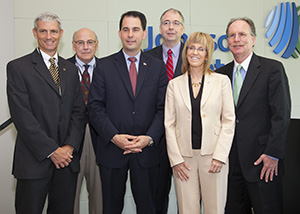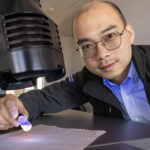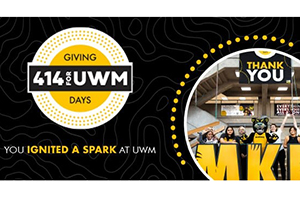Chancellor Michael Lovell remembers the day in 2008 – only his second day as dean of the College of Engineering & Applied Science – as he prepared for a meeting with representatives from Power Solutions at Johnson Controls (JCI). “I realized that one of the world leaders in energy technology was located right here in Milwaukee,” he said.
A multi-million investment by JCI is the culmination of three years of relationship-building by Lovell that already has produced a joint laboratory on the UWM campus where JCI researchers and UWM engineering faculty are working side by side. The money also funds an endowed engineering professorship that will be shared by UWM and UW-Madison, and graduate fellowships.
“The investment by Johnson Controls will make UW-Milwaukee the first university in the country to have a state-of-the-art dry lab designed to do prototyping and testing of a new generation of battery materials,” said Lovell. JCI’s investment marks the beginning of an unprecedented partnership between the world’s leading automotive battery supplier and the UW System’s two research institutions – one that will position Wisconsin as a global leader in energy storage. “Only a handful of entities in the world have the capabilities of this [dry] lab with its controlled environment and advanced equipment,” said Mike Andrew, director of governmental affairs and external communications for JCI, at the UW System Board of Regents June meeting. The partnerships will also result in a stable pipeline of graduates with technical talent. “The creation of this endowed professorship and research fellows will allow us to attract an internationally known scholar and the most talented students,” said Lovell. “I am very grateful to Johnson Controls for their willingness to expand their partnership with UWM.”
Battery R&D
Chancellor Michael Lovell tours the new battery lab in UWM’s engineering building with Mary Ann Wright, Vice President of Global Technology and Innovation for Johnson Controls Power Solutions. The battery lab is one of two at UWM supported by and shared with Johnson Controls.
The company’s main goal is to create and test innovations in the university labs and then identify those with enough commercial potential to warrant more focus. One aim, said Andrew, is to make rechargeable lithium-ion (li-ion) batteries more reliable and less expensive by simplifying the number of components and improving the in-cell monitoring function. Using nanomaterials, the cell will be a self-controlling device. Li-ion batteries are useful in hybrid electric vehicles because they’re lightweight, hold their charge for months and have a higher energy density than most other types of rechargeables. The downside is they are more complex to manufacture and come with some safety risks – they could overheat and ignite. The company also wants to continue producing new kinds of lead-acid batteries such as those called absorptive glass mat (AGM). These offer “start-stop technology” in which the batteries help gasoline-powered vehicles shut the engine off when the car is idling to reduce fuel use and emissions. Several UWM faculty members have research projects under way in joint lab at UWM. Associate Professor Junhong Chen is creating nanoscale in-cell sensors that will monitor conditions like heat. His lab also is working on tin-based materials to enhance li-ion anodes. The anode and cathode are the parts of a battery that facilitate the chemical reaction that creates an electrical current.

Professor Tien-Chien Jen, who is currently the College’s interim dean, is engaged in modeling battery behavior. Right now, he said, performance is being documented by trial and error. JCI wants Jen’s lab to build a 2-volt cell in controlled conditions to identify fundamental information that can lead to improved performance.
Assistant Professor Ben Church is setting up two systems to create novel cathode materials for li-ion batteries and a third for making anode materials. “These materials can then be put into small batteries for testing in the new joint battery lab,” said Church. “It’s a perfect collaboration in many aspects since JCI currently depends on vendors to supply these materials. Now, we can design and rapidly produce test samples with a wide variety of compositions and then test their performance – all right here.” Assistant Professors Ilya Avdeev and Liang Zhang are involved in the battery manufacturing process and cell-simulation.
Coming up
The Johnson Controls Endowed Professorship in Energy Storage Research will be responsible for maintaining the research labs and supervising graduate students at both UWM and UW-Madison. The hiring process is on the fast track, with a goal of filling the position this summer. As a group, the partners have applied for a grant from the U.S. Department of Energy to expand the research and will know the outcome later this month. Several JCI researchers at both institutions will become adjunct instructors and will be assigned doctoral students to support their research, which will be supported by faculty sponsors. In addition to the endowed professorship, Johnson Controls will provide $500,000 for an energy storage research laboratory and another $500,000 to support graduate research fellows, both at UW-Madison.







